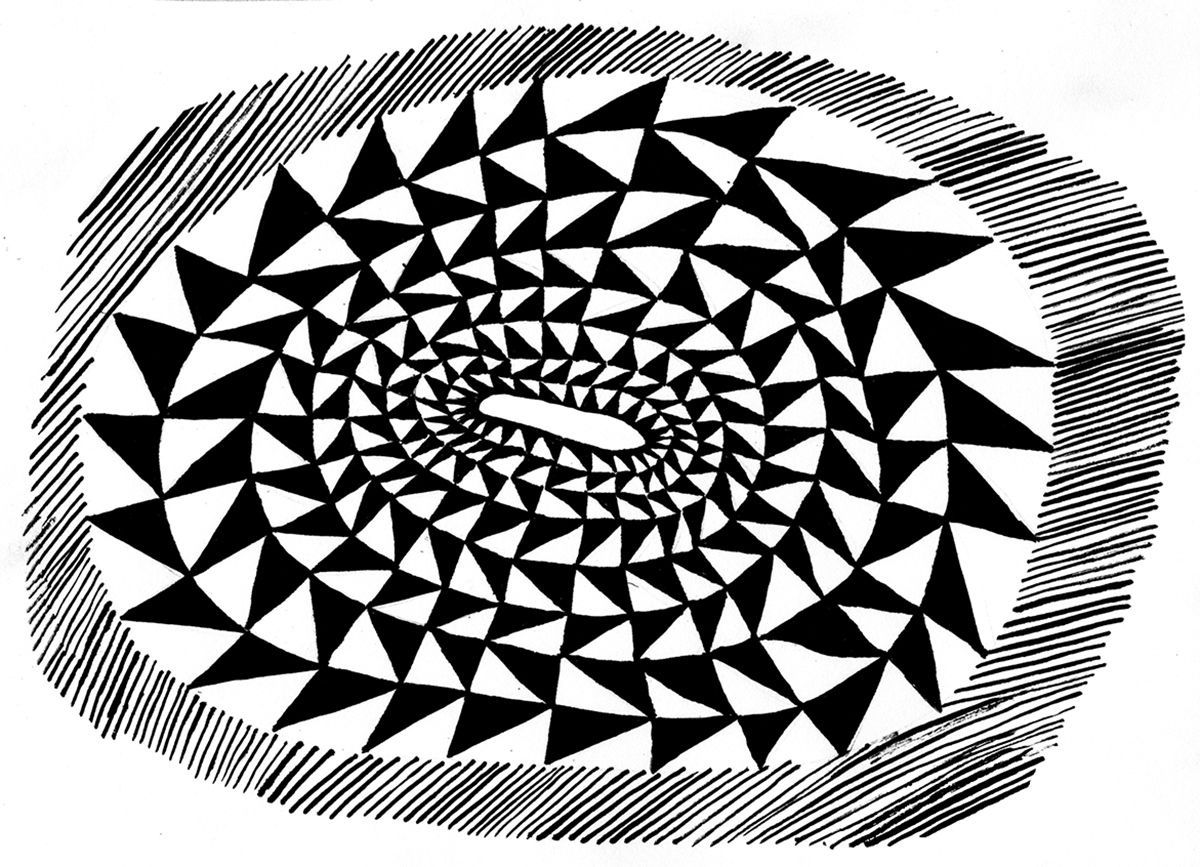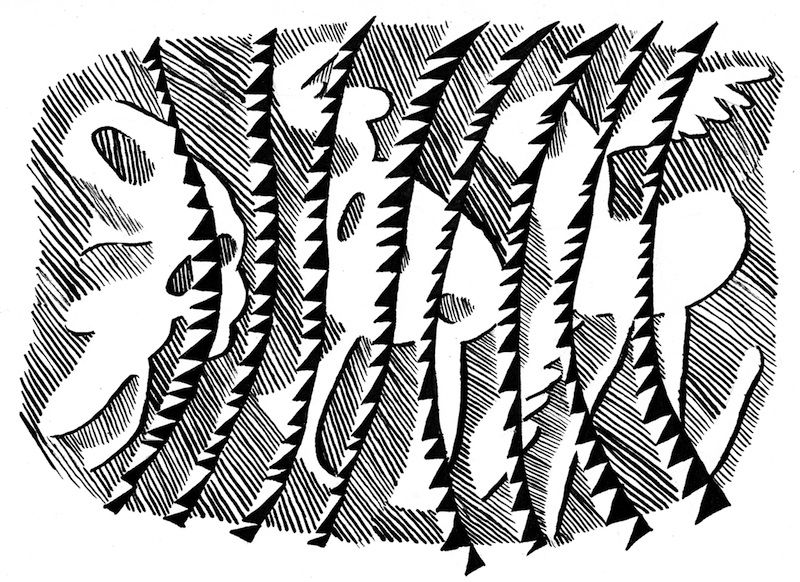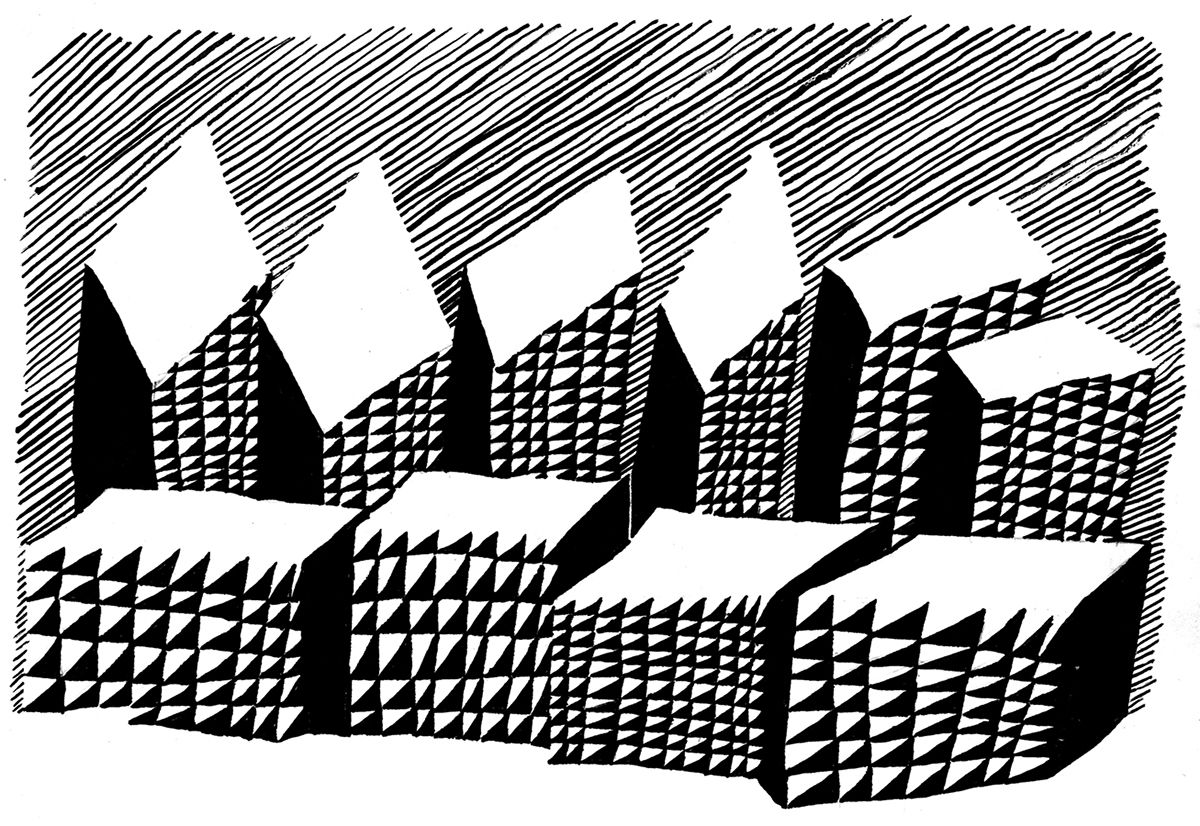Editors’ Note: What follows is an excerpt from the prison journal of Egyptian novelist Sonallah Ibrahim, translated by Robyn Creswell as “Notes from Prison.” On March 22nd New Directions will publish a larger selection of “Notes” along with Creswell’s new translation of Ibrahim’s 1966 novel That Smell. Today Guernica Daily also features an interview with the translator. The illustrations below are by Nathaniel Flagg and were inspired by the selection.
April
Cairo commits suicide. The fire of ’52. The city that rose up and fell destructively on itself. Story of freedom in the streets, among the people. The great, enormous city from every angle, its birthing pains.
The hero and the masses—Plekhanov—the cult of personality.
Torture: and since that time he feels that wherever he walks, whether he’s coming in or going out, something will hit him, something will shock him. If someone surprises him, his muscles tense. He expects to be slapped or kicked.
June
The thing I seem furthest from, though I think about it all the time and hope to achieve it, is to deal with man from within.
So many sentiments, so many strange and knotted interior operations.
Colors and their meanings. Red is love. Yellow jealousy. Blue sadness. Green loyalty. White purity. Purple yearning.
The writer’s path is full of sacrifices; everything must submit to his art. Pushkin wasted five years of his life chasing after his girlfriend while she toyed with him. The writer must not allow anything to get in the way of his work or his art. He is a saint and a martyr.

Here is the artist’s role in Egypt today. Not to write something enjoyable merely for its aesthetic value. Not simply to lose oneself in philosophical and intellectual issues. Not to live captive to one’s individual experience, which could lead to loneliness or to feelings of alienation and absurdity. Not to be content with recording—impressionistically, neutrally, superficially—what happens in society. Instead, the Egyptian artist must work actively and with others. He must dive into the depths of the people and the depths of the individual. He must reveal the way forward, he must choose the direction and change the direction. He must lead and play a role in everyday life, armed with his technique, personal experience, self-awareness, persistence, and the readiness to sacrifice.
The writer is responsible for every word he writes.
“When people talk, listen. Most people don’t listen.” Advice given by Ernest Hemingway in a letter to a young writer.
“The Beacons,” at the Twenty-Second Congress of the Communist Party of the Soviet Union:
—Alexander Tvardovsky: “The hero of my tale, whom I love with all my heart, whom I have tried to depict in all his beauty, who was, is, and will be beautiful, is the truth.” Tolstoy.
—“Those writers who hurry to respond to the demands of the day, who apprise us of contemporary events, deserve the sobriquet ‘skimmers.’ For them, the building of the Volga Canal doesn’t merit more than two or three on-the-spot articles, dashed-off and superficial. A mirroring of events and nothing else. But the same subject cost Vladimir Fomenko ten years of hard work. I cannot hide my fear each time I see writers hurrying to spread the news before the events and facts have matured in their minds, before they have experienced a deep need to communicate with the reader.”
—Sholokhov: “A writer who speaks of collective farms should know no less than a local agronomist.”
—I am a Communist first, a writer after that.
November
“The true material of film is the monologue,” Eisenstein.
No real interest in people. Each looks out for himself. Egotism. Where is the spirit of sacrifice, of consciousness-raising?
Psychological problems. Theft. The nature of conditions. Persistent belief in the impossibility of a long-term sentence.

December
The mouth, like the prison, contains, when closed, living things.
A story in two sections: in the first, people enter and do what they do and their actions appear strange, spontaneous, random, futile—in the second section, the same people behaving reasonably, or acting out an interpretation of their previous behavior, or of the laws that governed all those actions that had seemed random, futile, or accidental.

There is a law that governs everything, but we do not know it.
Again, the question of coercive conditions, of a power exterior to man. The law of probabilities?
The epic theater of Brecht.
How little I know.
Nathaniel Flagg’s comics have been featured in The Hairpin and Cluster Magazine and are posted regularly on his website. He is also an editor of the art magazine, Psychiana. He currently studies contemporary calligraphy and performance in Hangzhou, China. You can follow him on Twitter @nannafragg

